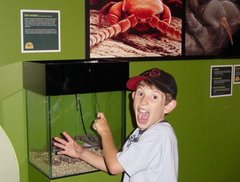Had a wonderful set of meetings yesterday and learned heaps. Made all kinds of promises for web links, etc so decided to just do a blog post to put them all together. These are my impressions folks, so please feel free to comment and correct!
My first meeting was with Xerxes, Stuart, Susie and Catherine at the British Museum. The BM is at the early stages of implementing an audience strategy, including ways to more closely integrate audience research across the BM, and the use of cross-divisional project teams in planning exhibitions. We had a wide-ranging discussion about the role of audience research, measuring learning, and I finally understand how to use audience segmentation (thanks for that Xerxes!). The way the Interpretation Unit is set-up where staff take on roles of audience advocate and visitor research, among other things, was really interesting with the potential to shake the BM up over the next few years – one organisation to watch I think. I was also fortunate to catch up with Stuart to talk all things web and their plans for e-commerce and online access. Stuart is also very interested in the ideas surrounding online learning, which was great to hear.
Here are the links I promised you:
audience-research » Audience Research Articles – scroll down this page to download the paper
Evaluation, Research and Communities of Practice: Program Evaluation in Museums. This paper outlines the history of audience research in museums, what it's all about and what are the future challenges
audience-research » Museum Learning – here's where various chapters from my thesis can be downloaded. Chapter 2 is the learning literature review and Chapter 7 outlines the major findings, how they relate to the literature and what they mean for museums
Resources page on my website – contains the pdf file Writing Text and Labels (go down the page a bit)
Stuart, here are the blog addresses/posts I promised:
Introduction to museums and Web 2.0 – my post about what Web 2.0 is with relevant links
fresh + new blog – Seb's blog about digital media and museums
Museum 2.0 – Nina Simon's blog about museums, web 2.0, design and many other gems
Post about social technographics on fresh+new. I bought this report and it was worth the money, we're doing a similar study in Australia
M&W paper on web users – proposes a useful typology of online learners
Next was a detailed visit to the Natural History Museum. Catching up on gossip with Michael, sharing various Facebook addiction stories, lunch with Emma and Georgina was followed by a tour through the systema metropolis exhibition with Alice. I have published my review of this exhibition on the ExhibitFiles website, but am unable to upload images for some reason (I think due to my hotel's web access), so I'll add them later.
A very invigorating two-hour seminar followed with a range of staff from learning, interpretation, content, multimedia and web who kept me on my toes! Again a wide-ranging discussion with a focus on how to get findings acted on, different methods for doing research, budgets, using consultants, all things web and the future and, finally, where best to place an audience research function (my answer – needs to be separate and report to a senior level to keep objectivity and enable research to feed in to the institution at the highest levels). The seminar was taped and I might post a short excerpt if I'm feeling brave (and have not been too much my usual tactless elf!). Finally, after birthday cake, I consumed several lagers at the Hoop chatting to some of the curators feeling I could have been back in Sydney – same issues different museums!
Here are the website addresses I promised (additional to above):
AMARC: Australian Museum Audience Research Centre – my website with various links and resources
I also need to post a link to my Visitor Voice post on the New Literacy, New Audiences blog but it seems to have disappeared! Will follow that up.
Thanks to all for a great day! See you on Facebook J.


